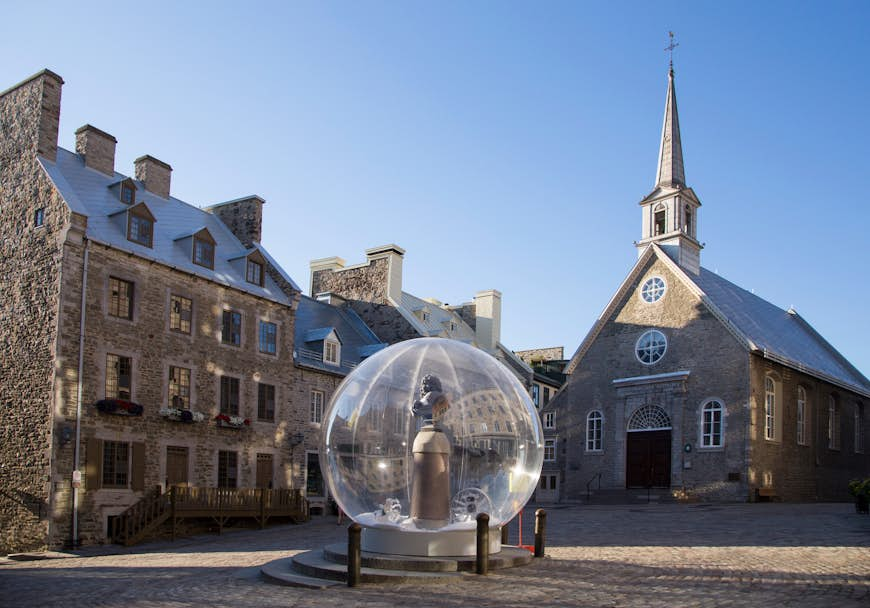Québec City is known for its enchanting architecture and historic vibe – a French-Canadian city that feels European, with a side of deliciously gooey poutine.
Its vibrant culture is celebrated through festivals, monuments, walking tours and food. In spring, the city is full of children on class trips, who give way to throngs of travelers in summer, while cruise ships line the port until autumn.
Enjoying life is at the heart of Québec’s culture – and fortunately for visitors and locals, this means plenty of things to do throughout the year that don’t cost a dime. Read on for our picks for the best free things to do in Québec City.
Channel military history at the Plains of Abraham
Steps away from the Porte St-Louis and stone defense walls of Old Québec is the largest park in Québec City, the Plains of Abraham (also known as the Battlefields Park). The site contains traces of the 1759 battle that ushered in British rule, including British Martello towers, a massive armory building, defensive walls and canons – reminders of this peaceful park’s violent past.
In the summer, the lawns are green and lush, with sections shaded by voluminous trees and small calming gardens filled with color. Trails are ideal for walking, jogging or cycling, while each July half of the park bumps and vibrates with live music performances during Festival d’été de Québec. In winter, covered in snow and ice, the park becomes a popular place for locals to cross-country ski, snowshoe and ice skate. Quebecers love their outdoor exercise, no matter the time of year.
Get in the democratic spirit at the Assemblée nationale du Québec
Bronze statues of historical figures watch over the grounds from the Hôtel du Parlement’s facade and along stone pathways, and small, fragrant gardens beckon visitors to wander and relax. Inside the building is where the Assemblée nationale du Québec does its work. The complimentary guided tour will lead you through key moments in Québec’s history, as you wander down echoing halls and into grand assembly rooms where intricate architectural flourishes edge the walls and windows, and delicate crystal chandeliers dangle from the ceiling. You don’t need to be a devoted politico to enjoy this piece of Québec’s past and present.
Wander the Passages Insolites
Come summertime in Québec City, a provocative public art event takes place all over town. Starting on the cobblestone streets of Petit-Champlain, stretching into the neighborhood of Old Port and winding its way into St-Roch is the annual presentation of Passages Insolites. While the art changes each year, the range of emotions experienced as you walk to each location is a constant. The larger-than-life inflated clown’s head squeezed between two buildings in 2019 was intriguing during the day and creepy at night. In 2018, a monument for Mary Ann by Jean-Robert Drouillard, a tribute to a Panis enslaved person who escaped her owner in Place-Royale, faced the bust of King Louis XIV. After four years, its silent power remains.
Come for the fun, embrace the weird and leave your soul open to being moved.
Find tranquility in the Séminaire de Québec courtyard
Walk along the path to the left of Notre-Dame-de-Québec Basilica-Cathedral, through black wrought iron gates and into the small courtyard of Séminaire de Québec. The white stone building, with its dormer windows lining the shiny metal roof, is filled with boisterous school kids. Grey lines form a square on the ground to the left of a door leading to the school: this is where the 17th-century house of Hébert and Marie Rollet once stood. It was here, in 1633, that Olivier Le Jeune, the first enslaved Black person to arrive in Québec, was “given” to Hébert and Marie’s son-in-law Guillaume Couillard.

People-watch on Dufferin Terrace
This long wooden boardwalk extends along the top of Cap Diamant, wrapping around Château Frontenac and hiding the remnants of a 17th-century fort beneath its boards. The promenade is wide, with green wooden benches and gazebos topped with green and white stripes. From here, you can see the St-Lawrence River snaking past the city and the 17th- and 18th-century stone houses of Petit-Champlain and Place-Royale perched below. In summer, the boardwalk is alive with music and acrobatic performances. In winter, it’s home to one of the oldest attractions in Québec City, the Glissade de la Terrasse – think long wooden sleds with curved fronts and red cushions quickly gliding down a steep, slippery slide. It’s quite a ride.
Read up (in English) at the Morrin Centre
Down rue Ste-Anne in Old Québec is the Centre Morrin, with its grey stone facade and angular roof. Up the stairs to the right and down a short hallway you’ll find a Victorian-era library, the only English-language one in Québec City. As you step in, you’ll hear the warm-colored wood floorboards creak as a red-coated statue of James Wolfe gazes down from an upper balcony.
This building started out as a royal redoubt before becoming a jail and gaol (1812–67), then a college and finally the home of the Literary and Historical Society of Quebec. A tour (for a fee) will guide you from the remnants of a jail cell in the basement, past the gaol window, to the college rooms on the top floor and up to the library’s upper level.

Take a free historic walking tour
Charismatic guides begin their free tours from the Hôtel du Parlement grounds, meandering through Old Québec’s Upper Town streets, before descending the Breakneck Steps into Petit-Champlain and Place-Royale. Through stories and clever anecdotes, the guides weave pieces of Québec’s history together, bringing the city alive. Begin your weekend in Québec City with a walking tour, and you may find yourself falling in love and plotting your return.
